From Blockchain to Distributed Ledger Technology (DLT) If you follow the news, you might have realized that the term DLT is currently more and more used to describe what we usually describe with “the Blockchain”. Even though the definitions are more or less subjective, a good comparison between these technologies is here. In really easy terms, the DLT is the Blockchain without the “chain of blocks”, which also means without the security and immutability of the blockchain. However, as with private chains vs. public chains, this might exactly be what you need for your use case. So, keep in mind that Bitcoins are not the Blockchain and that the Blockchain is more than DLR and all of these technologies fit perfectly to their use cases, which are certainly not the same. It helps to know about the definitions to get more information about the complete topic, since DLT is not as spammed (aka SEOed) as Blockchain, a Google searchs gets you more valuable results like the BaFin evaluation and the really well made UK Government Science report. Even more about the Blockchain Fed up with all the small bits and pieces about Blockchain technology on all those news sites? Then read a book, we recommend “The Blockchain” from leanpub and hope that it will be completed soon. More into videos? Then watch primavera in her talk about Skynet or Freenet or her more current talks.
KW 20.16 – Weekly Blockchainers Recap
The DAO .. reached $ 157 mio. founding. The ethereum based crowd funding decentralized business organization collects a lot of money to support ether based business. It looks like the first blockchain venture capital organization to boost the ethereum cosmos. Strong disruption alert ! Deloits Rubix blockchain Beta launched Deloits starts their own blockchain program Rubix. It focuses on Enterprise Blockchain distributed apps (Dapps). Rubix should become an industry-leading blockchain infrastructure provider. It’s still enough space for solution witch helps to transform the old economy to the distributed economy. The DAO – Part 2 What is it? Is it a bubble or even a ponzi scheme (as everything unknown is a ponzi scheme obviously)? Is it a great investment possibility? Is it Freenet or Skynet? Or is it just the betting on Vitalik Buterin and his gang that they will put forward something extremely useful which is worth all this founding? Make up your own mind, but beware that this is no recommendation to buy DAO-Tokens. Don’t get it wrong: we actually believe in the concept of the DAO and that it will establish an intelligent, interactive investment possibility with huge gains, but looking at the current DAO: ~$200 mio. for slock.it and another, not even published proposal? Smells like tulips.
KW 19.16 – Weekly Blockchainers Recap
NATO Blockchain Innovation Contest The NATO is a decentralized organisation with a lot of partners, processes and logistical challenges. It’s a clever idea to use a decentralized ledger for a couple of problems in this kind of organizations with strong security needs. They start with an inovation contest to find good use cases. Congratulation for this innovative approach. Cryptovalley Zug accept Bitcoins The city Zug in Swiss starts to accept Bitcoins on first of July for the payment of public services. It looks like a good marketing strategy for the local economic promotion. Zug is know as the hometown of Ethereum and other crypto companies. (Sorry, the official city website is just in German.) Youtube channels If you don’t find anything on TV look at : A presentation from BlackRock Engineering about Ethereum or the channels from Andreas M. Antonopoulos and BitBond
Ethereum Development Tools – an Evaluation Matrix
Developing for the Ethereum World Computer – Revisited
When comparing development methods for and in the Ethereum space, it becomes obvious how brilliant the people involved actually are: as a developer, you have several choices of great development tools and environments, even though the development process for Dapps is quite difficult: it involves different “layers” (frontend with HTML/CSS/JavaScript and backend with the Ethereum blockchain), different languages (JavaScript for frontend dev, Solidity for backend dev), different contexts (public/private/proprietary blockchains).
Taking these different contexts into account, evaluating the different development environments is only possible by identifying the different aspects and value them according to the own preferred usage.
Aspects of Dapp Development
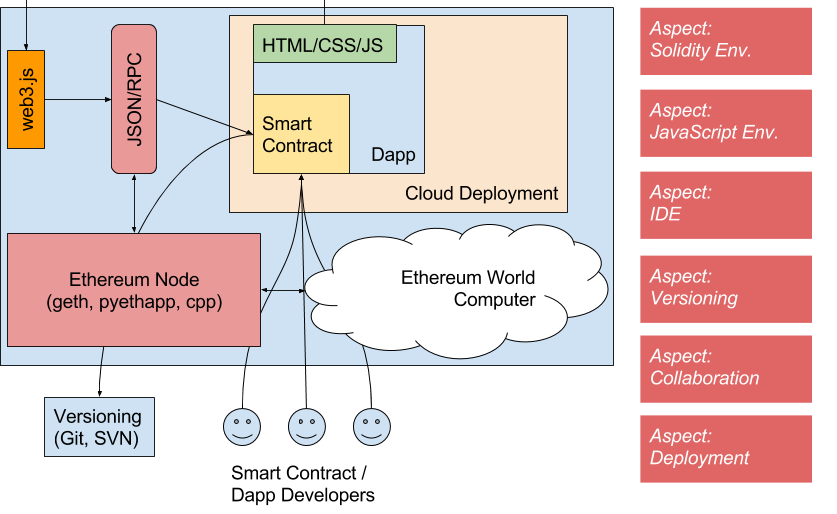
- Solidity Development / Solidity Environment
User can edit Solidity content in a text editor, there should be at least syntax highlighting. - JavaScript/Web Environment
User can edit JavaScript, HTML and CSS in a text editor and gets different levels of support like syntax highlighting, code completion, etc. - IDE
User can not only edit code (Solidity and JavaScript), but can also compile, check into a versioning system, debug and deploy to some operating environment. - Versioning
Versioning is supported, eg. by enabling the user to check edited content into a versioning system, show diffs, apply patches, etc. - Collaboration
Modification of code by multiple users is supported, at minimum support of different versions of the code is possible to avoid conflicts. - Deployment
Working code can be deployed to some environment which enables the user and other users to use the working program (a sandbox or real blockchain and a web application server for JavaScript like node.js and static content like HTML and CSS files)
A first Categorization and a Teaser
We will summarize in short the different aspects which are supported in these development environment: Solidity Browser / Ethereum Wallet, Truffle and Ethereum Studio.
This is also a teaser for the upcoming blog posts, which will explain the environments in detail.
Solidity Browser / Ethereum Wallet
In terms of architectural styles, both environments represent minimalism. They are slim and handy, easy to use and fast to learn, but lack some functionality if real development “in the large” is necessary.
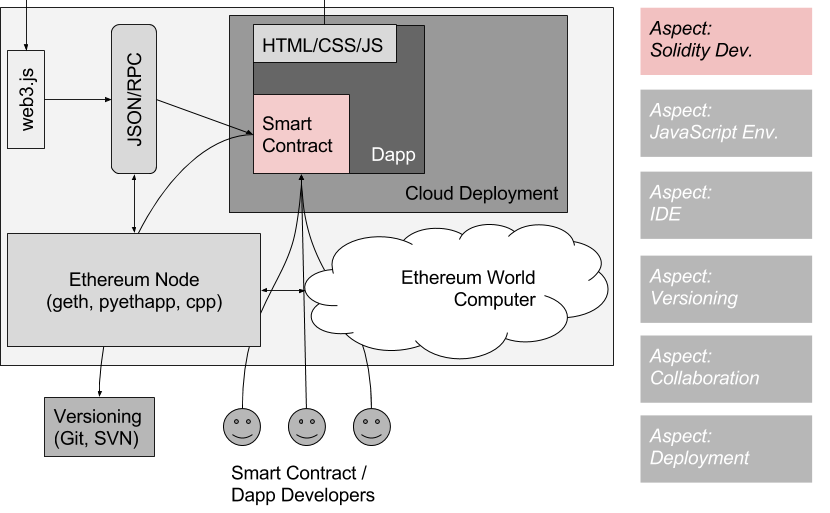
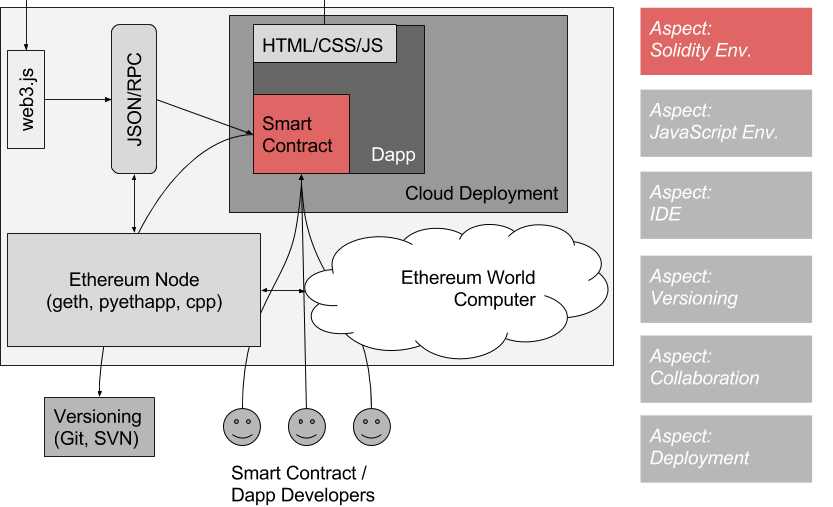
Truffle (also: Embark, Dapple)
Truffle satisfies all aspects which a usual client application can offer, therefore you can think of Gothik, it is mighty, almost lavish, and well structured. If you come from web development in JavaScript with node.js, who should look no further, this environment is for you (at least if you don’t need support for online development, versioning and multi user directly in your environment, but use external tools like Git and testrpc for these aspects).
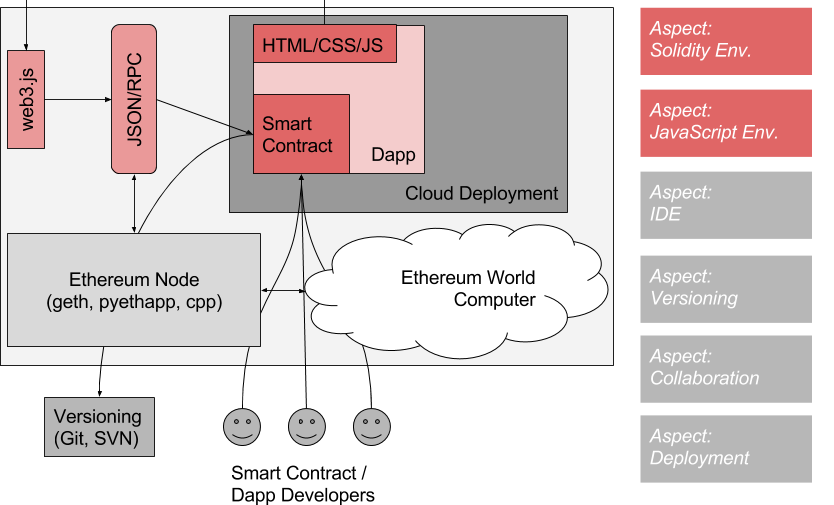
Ethereum Studio, the all-in-one-solution
The Ethereum Studio, in our opinion, resembles Deconstructivism. Why’s that? Because here all aforementioned aspects of software development are taken apart and are reconstructed to fit perfectly to Dapp development. This is an all-in-one-solution which we can really recommend, with two limitation: you have to agree to a uncertain pricing model (it just doesn’t exist right now, you can still test the product) and a “closed” environment, which works seemless and smooth, but expects you to let in to this tool and the development process.
But no other tool lets you test your code this easy with manual and even unit testing built into the environment.
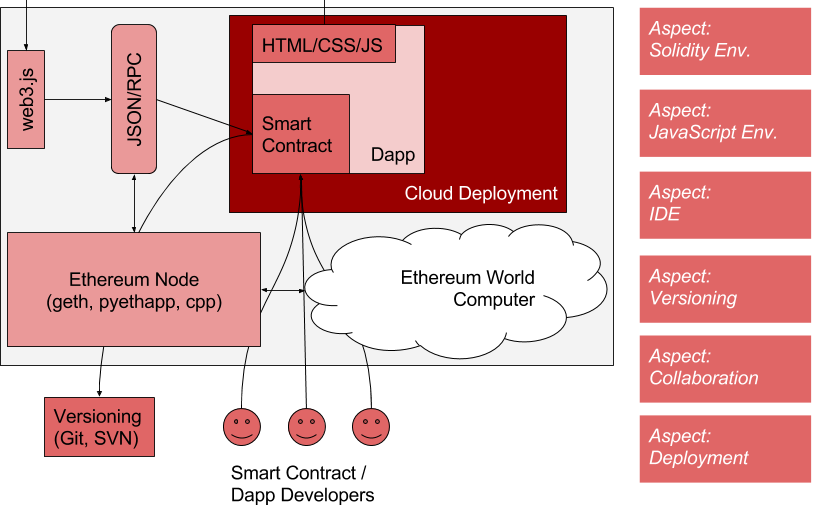
Stay tuned for the detailed explanations of these great development tools.
KW 18.16 – Weekly Blockchainers Recap
Amazon’s Blockchain as a Service Amazon announced Blockchain as a Service. You can use a blockchain from Microsoft Azur or from the IBM Cloud, now Amazon also want to offer a service. I like working with AWS, so I hope the blockchain service will fit perfectly to the existing datacenter services. Akasha Project The Akasha Project has a high disruption potential. It is a decentralized social multimedia network, based on Ethereum. Akasha could be a game changer. Satoshi Nakamoto This week you found many articles about Craig Steven Wright. “Is he Satoshi, or not”, the trough is … the articles are interesting, but you know nothing, Jon Snow.
KW 17.16 – Weekly Blockchainers Recap
ECB – works on blockchain The European Central Bank works on blockchain concepts, but they don’t talk about their own currency, they just spend some work on distributed ledger technologies (DLT). Since R3 announced Corda the big players don’t talk about blockchain anymore, they use the description DTL. more IBM IBM launch a blockchain cloud service, you can start your own test environment directly at the Bluemix site. Local Meeting in Ethereum Space: the Ethereum-MZ meetup Last week there was an Ethereum Meetup in Mainz (at the Hipster space dock eins mainz, an old customs port). So, Mainz really is a beautiful city, but with 200.000 citizens, why is there a Ethereum Meetup? For a really good reason: Heiko Hees, core developer of the Ethereum Python client pyethapp, which is one of the Ethereum Foundation supported clients, founded his company brainbot technologies AG there. Heiko and Max from brainbot gave a introductory talk about Ethereum and an insight in developing for the platform with the Ethereum wallet to an interested and active auditorium. Several people had to leave at 11 pm for Frankfurt, but would have liked to stayed even longer. Nice, interested people, cool location and last but not least beer & pizza. Thanks again Heiko & brainbot! If you have the opportunity to go to the next meetings, you should not hesitate.
KW 16.16 – Weekly Blockchainers Recap
Die Blockchain bei der JAX 2016 Vom 18.04. – 22.04. fand mit ca. 2000 Besuchern die größte Entwicklerkonferenz Deutschlands in Mainz statt. Anfänglich stand JAX für Java, Apache und XML und dies sind auch immer noch die Schwerpunkte, es geht viel um Enterprise- und Webentwicklung mit Java, um Architekturen und Vorgehensmodelle in der IT usw.. Umso erstaunter war ich, dass mit Taming the Bitcoin Blockchain von Caterina Rindi ein reines Blockchainthema als Keynote vorkam, zwar erst um 20 Uhr abends, aber mit ca. 200 Teilnehmern sehr gut besucht (von denen auf Caterinas Nachfrage auch einige Bitcoins besitzen). Der Vortrag war eine gute Einführung, Caterina kam über NGOs zu Bitcoins und beschäftigt sich seitdem aus einer fachlichen Sicht mit der Blockchaintechnologie. Eine weitere Nachfrage von Caterina ans Publikum: „wer kennt Ethereum?“. Auch hier gab es vereinzelte Meldungen, aber „noch zu wenig“. Genau dies war auch die Kernaussage Ihres Vortrags: ihr seid Entwickler, ihr könnt mit dieser Technologie die Welt ändern, also macht das auch. Dieser Aussage können wir uns nur anschließen. Decentralized, Peer-To-Peer Bitcoin Exchange Bitsquare to Launch Next Week Nachdem mit OpenBazzar ein peer to peer Marktplatz für alles mögliche live gegangen ist, gibt es bald die dezentrale Bitcoin Börse Bitsquare. Der Ansatz ist hat ein hohes Disruptionspotential. Zentrale Marktplätze bekommen Konkurrenz. SWIFT arbeitet an der Blockchain Technologie Bekanntlich ist das SWIFT Netzwerk der quasi Bankenstandard. Die Blockchain Technologie gefährdet dieses Monopol. Um selber im “Driver Seat” zu bleiben, arbeiten sie jetzt intensiv an dieser Technologie.
KW 15.16 – Weekly Blockchainers Recap
The FED discuss the potential of blockchains A member of the US Federal Reserve’s board of governors issued new remarks this week on the potential of blockchain technology. In her speech, Lael Brainard said she believes the financial industry and regulators should be optimistic of technologies that have the potential to bring positive change. Ethereum based Energy trading The idea sounds good, you can sell your energy from your solar cells direct based on Ethereum smart contracts to an end user. The decentraliced energy market fits to the decentralized privat energy producer. Strong disruption alert on this concept. Andreas Antonopoulos .. has published a new motivating video about Bitcoin basics and ideas. Better than boring TV shows in the evening. He is an inspiring Bitcoin evangelist.
Wir machen uns die Welt … wie sie uns gefällt
Nach der Entdeckung der neuen Welt und dem Überwinden der ersten Hindernisse wollen wir uns nun sesshaft machen und anfangen, Applikationen und Smart Contracts jenseits von “Hello World” zu entwickeln.
Aber wie fangen wir an? Die ersten Erfahrungen mit dem fantastischen Tool cosmo.to waren viel versprechend, leider ist das Tool mittlerweile online nicht mehr verfügbar. Der wahrscheinliche Grund ist die Tatsache, dass das Standard-Ethereum-Wallet von ethereum.org die gleiche Funktionalität und noch viel mehr bietet. Allerdings zu Lasten der Übersichtlichkeit.
Wir wollen deshalb hier einen Überblick der bekanntesten Entwicklungsumgebungen geben, mit einer subjektiven Einordnung in Architekturstile:
- Minimalismus: minimal, übersichtlich, aber auch schlicht: der Solidity Browser. Super zum Erlernen der Sprache Solidity, aber das war’s dann auch schon. Persistierung? Versionierung? Alles nicht vorgesehen. Super für den Einstieg.
- Bauhaus: funktional und praktisch: das Ethereum Wallet dient nicht nur als Wallet selbst, sondern ermöglicht die Erstellung und das Deployment von Smart Contracts und die Verwaltung von eigenen Tokens.
- Gotik: opulent, gut strukturiert, mächtig: Truffle ist ein reines Javascript-Framework und verwendet alle Komponenten, die moderne Javascript-Entwicklung bietet: Gulp, Mocha, Chai, etc. Sehr gut dokumentiert, ebenfalls gut für den Einstieg geeignet, bietet darüber hinaus aber auch viel mehr.
- Kubismus: ganz anders, aber erfolg- und einflussreich: die Entwicklungsumgebung von Microsoft, Visual Studio (Community) oder der neue Open Source Editor Visual Studio Code zusammen mit BlockApps STRATO, einer zentralisierten Blockchain. Leicht zu nutzen, mit automatischer Frontenderstellung. Etwas für den anderen, schnellen Einstieg in private Chains mit Microsoft Azure.
- Dekonstruktivismus: das “new kid on the block”, das Ethereum Studio von <ether.camp> macht alles etwas anders, nach unserer Meinung auch besser: eine verteilte Entwicklungsumgebung auf Basis von cloud9, ein integrierter Sandbox-Ethereum-Node, eine Deploymentmöglichkeit in alle möglichen Umgebungen (die JSON-RPC verstehen). Leider auf Dauer nicht kostenlos, Preise sind noch nicht bekannt.
In den nächsten Wochen werden wir die hier erwähnten (es gibt noch zahlreiche andere!) Entwicklungsumgebungen genauer testen, immer mit dem gleichen Tokenbeispiel. Stay tuned!
KW 14.16 – Weekly Blockchainers Recap
R3 Introducing Corda R3 works on their own distributed ledger Systems Corda. The first blockchain test from R3 with 11 banks based on Ethereum and Microsoft technologies. Corda should not become just another blockchain, it should be something different, a distributed ledger between trusted partners. more IBM IBM starts to combine their blockchain activities with watson. I think watson is a realy interesting AI technology. I have no idea what kind of product will come out of this combination. We have to look on this activity. more Microsoft The Microsoft Ethererum blockchain activities looks pretty serious. Azure can become a standard cloud service for blockchain nodes. OpenBazzar OpenBazzar is new decentralized market place. In the new Silicon Valley econnomy the market places have the control about every transaction. OpenBazzar can break this new empires with a new concept of a decentralized marketplace with bitcoin based transactions.
